Online talk given in December 2021
Gideon Levy is an Israeli journalist, currently for Haaretz, and author. Levy has won prizes for his articles on human rights in the Israeli-occupied territories.
Levy was drafted into the Israeli Defense Forces (IDF) in 1974 and served as a reporter for Israel Army Radio. From 1978 to 1982, he worked as an aide to Shimon Peres, then the leader of the Israeli Labor Party. In 1982, he began to write for the Israeli daily Haaretz. In 1983–87, he was an assistant to the editor-in-chief.
He has written a column called “Twilight Zone” about the hardships of the Palestinians since 1988. In 2004, Levy published a compilation of articles entitled Twilight Zone – Life and Death under the Israeli Occupation.
Sarah Helm, former Middle East correspondent for The Independent, was a staff correspondent for The Sunday Times and foreign correspondent for The Independent. She is the author of two books on World War Two, most recently, If This is A Woman, about the Nazi concentration camp for women. Her play Loyalty, about the Iraq War, was staged at The Hampstead Theatre in London. She is now working on a book about Gaza.
Sarah Helm:
So Gideon, first of all, it’s fantastic to meet you. I’ve can’t believe that we’ve never met, as I’ve been writing quite a lot about your favorite subject for quite a long time, but our paths don’t seem to have crossed. But of course I’m a huge fan, and dying to know more about the way you work and so on.
One thing, I’d like to start by asking you to tell me a little bit about how you came to be such a very strong critic of the Israeli government and the Israeli treatment of Palestinians in the occupied territories. I noticed you said somewhere that when you did start out as a reporter in that field, that you didn’t really understand the major problems that existed, or the human rights violations that were happening in front of your eyes. You said you were young and brainwashed at that time. I wondered if you could start by telling us how did that change? Was there one single incident that really brought it home to you? And could you tell us about that?
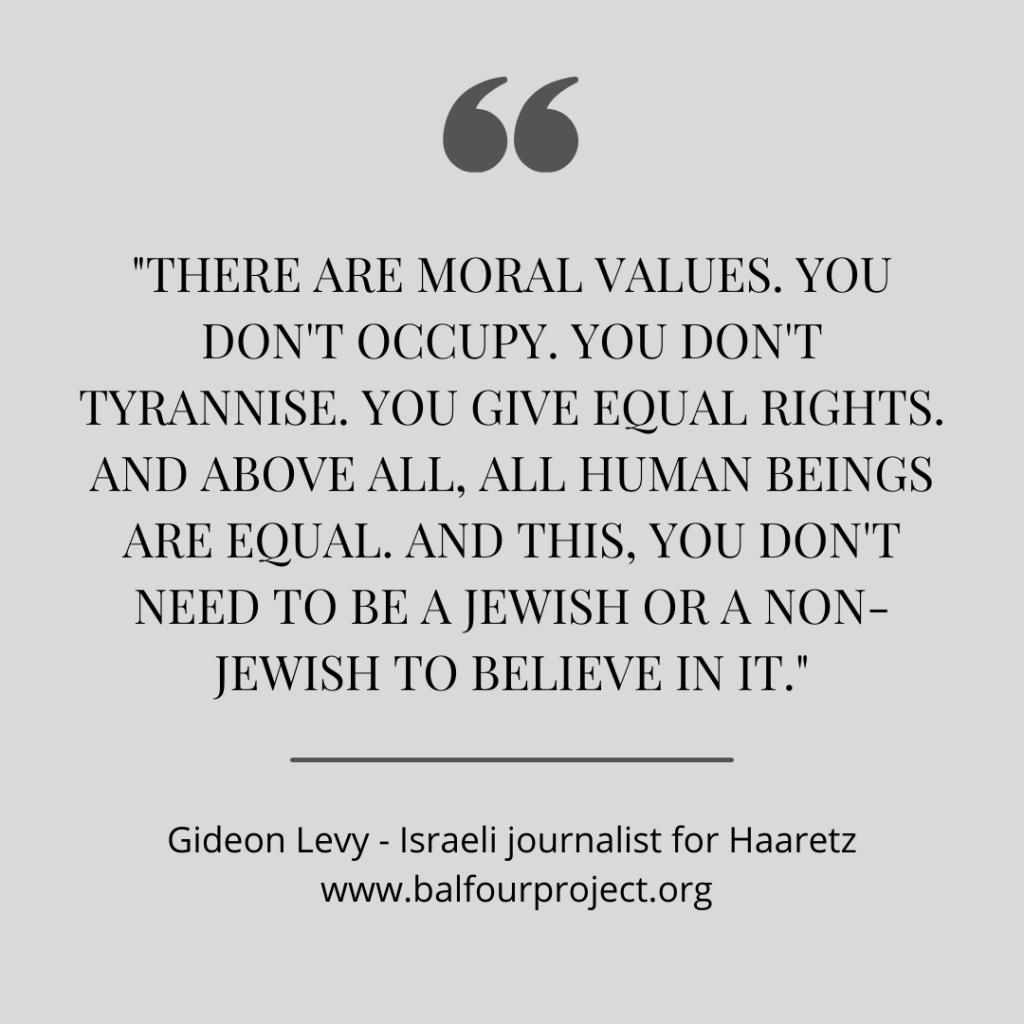
Gideon Levy:
I’m really happy to be with you today, as the interest in these issues that we are going to discuss today is decreasing, unfortunately, not only in Israel, but recently also in Europe. And therefore, I see such a significance in these kind of occasions, still to remind the world that somewhere in the Middle East, there is an apartheid state, somewhere in the Middle East, there is a brutal military tyranny. And something in all of us makes us forget, not think about it, not talk about it, and believe that if we will not talk about the elephant in the room, the elephant will just vanish. So, it doesn’t.
And to your question, Sarah, I always say I was a very good boy Tel Aviv or a very good boy Israel, a typical product of the Zionist brainwash system or education system. You can name it as you wish. Really, a good boy. I served in the army. I did even something which is worse than this, working for Shimon Peres for four years.
And only in the late ’80s when incidentally, totally incidentally, I started to travel to the occupied territories, I realised two things. First of all, that this is the place where the identity Israel is defined. The moral profile of Israel is not defined. The moral profile of Israel is not defined in the concert halls in Tel Aviv, with all the liberals. The moral profile of Israel is defined in the refugee camps in Gaza and in the West Bank. There is where Israel is defined. So this was the first insight that I got after a few visits there.
And the second one was that there’s almost no one to tell this story of the occupation, at least not for the Israeli media. There were then very few journalists who did it. Today, they’re even fewer. And then gradually I came to the conclusion that I would like to dedicate my career to covering the occupation, not to cover the Palestinian people, not to cover the Israelis, to cover the occupation.
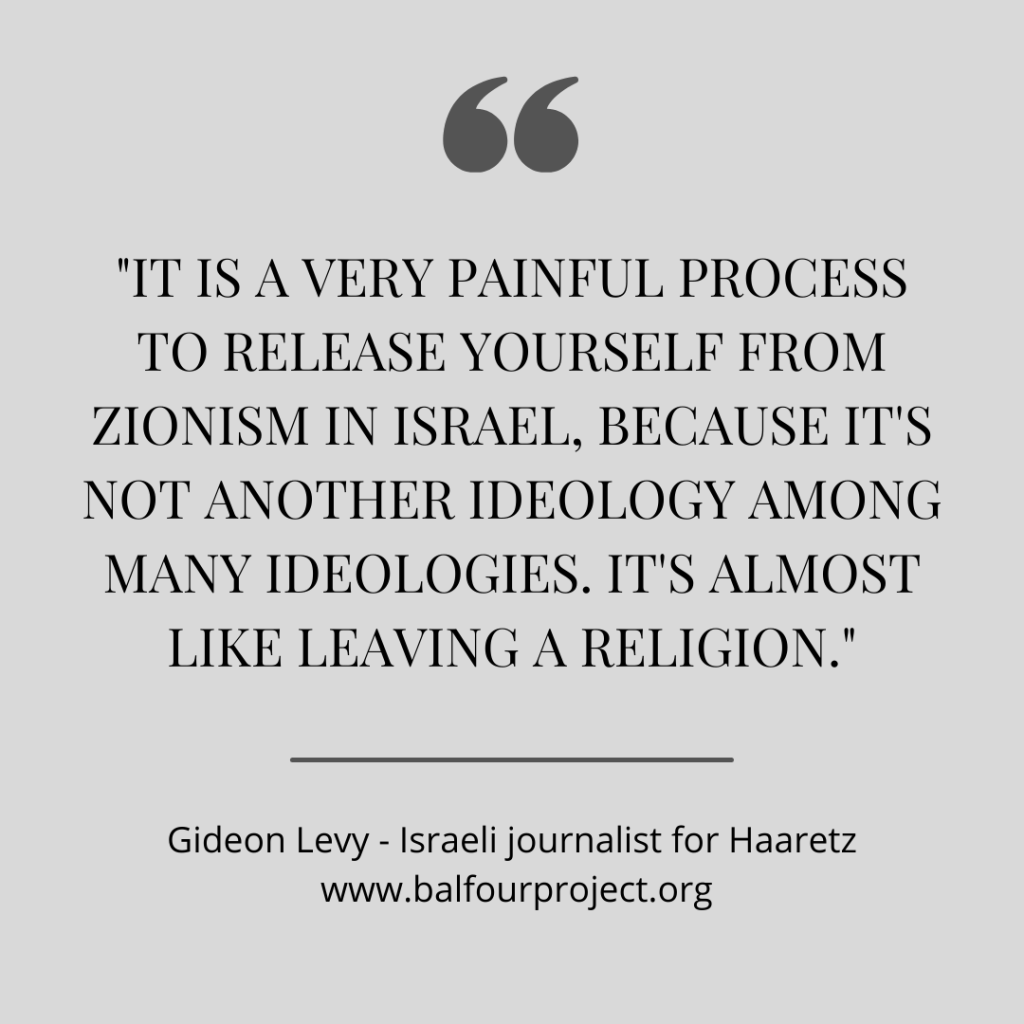
And ever since then, gradually, but very constantly, my political views changed and changed and changed, because what I was witnessing, because what I was documenting, because what I saw in my eyes, which so very few Israelis unfortunately are exposed to. And here I am today, much more radical than I was 30, 40 years ago, much less Zionist than I was. Practically, not Zionist at all, which is almost a crime in Israel, not being Zionist.
Sarah:
Can I just pick you up on that? As you raised that, I was just reading some of the things that you’ve said and written over the years, to remind myself, you were interviewed by my former colleague, Robert Fisk, who sadly died recently, not so long ago.
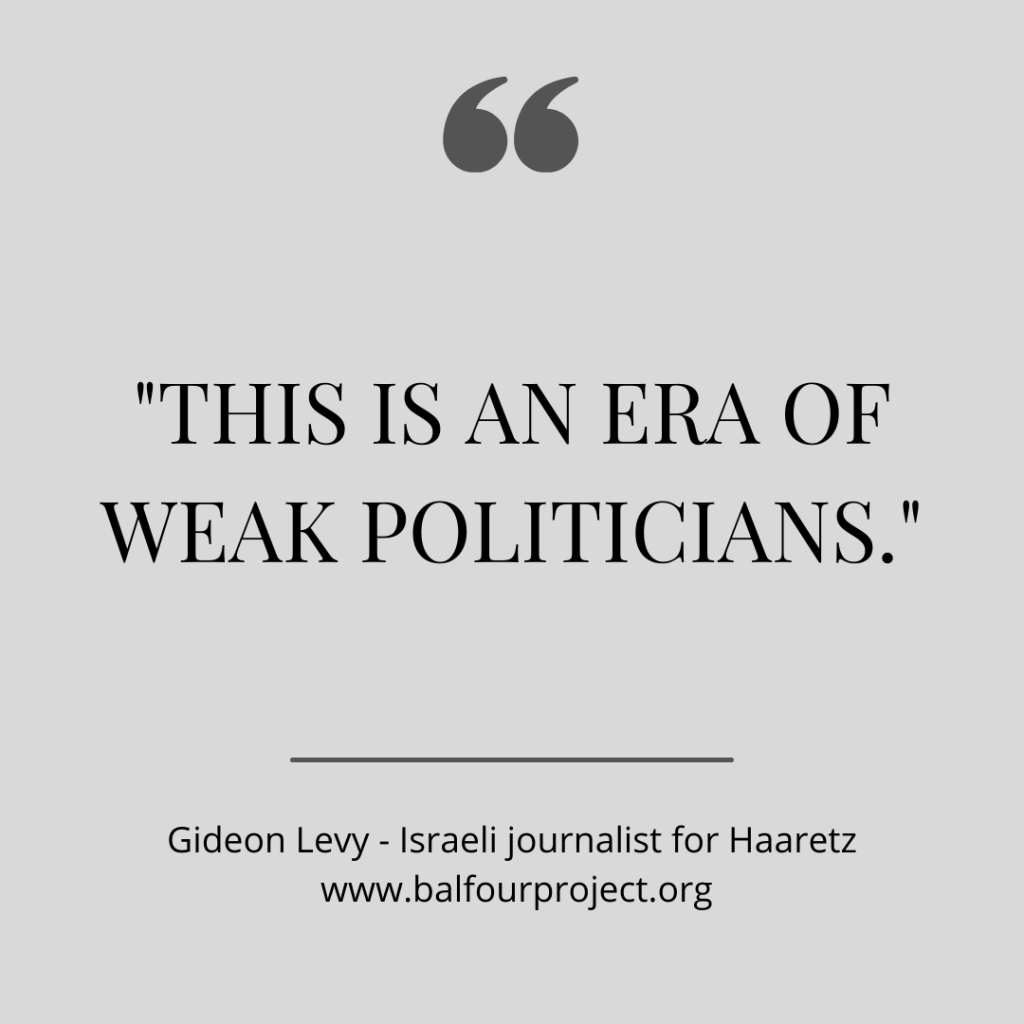
I think it was to Robert you said how badly the story was now being told. You said, “I can tell you really without exaggeration, if an Israeli dog was killed by Palestinians, it will get more attention in the Israeli media than if 20 Palestinian youngsters would be shot dead by snipers on the fence, without doing anything in Gaza.” Those kind of things, by the way, I couldn’t get a way with, or I wouldn’t be able to have published in the British press. We’ll come back to that.
But they’re so strong. Do you actually call yourself an anti-Zionist?
Gideon:
First of all, it is a very painful process to release yourself from Zionist in Israel, because it’s not another ideology among many ideologies. It’s almost like leaving a religion. It’s almost like being absolutely anti-communist in communist Russia.
Because as you know, because you’ve been here so many times, Zionism is not only the dominant ideology in Israel, it is the only legitimate ideology in Israel. Anything which put questions about Zionism is not legitimate in Israeli discourse. I was part of it.
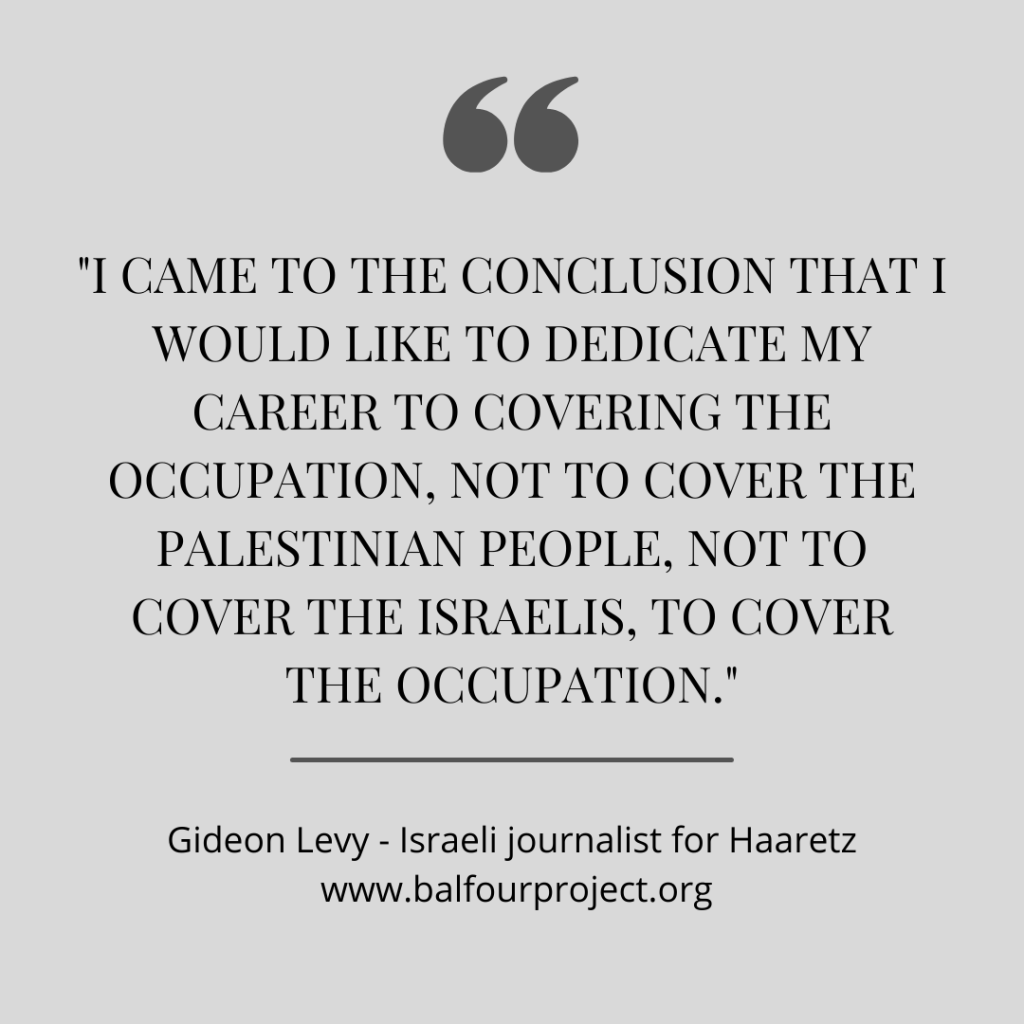
So for me, even to define myself verbally as not Zionist or even anti-Zionist is still, I must admit, a very painful process. Because by this I say, I am behind the fence. I am not with you Israelis.
Sarah:
Do you interpret that as saying, if you say you’re anti-Zionist and you’re an Israeli, that you actually are against the creation of the state of Israel? Is that basically what it means?
Gideon:
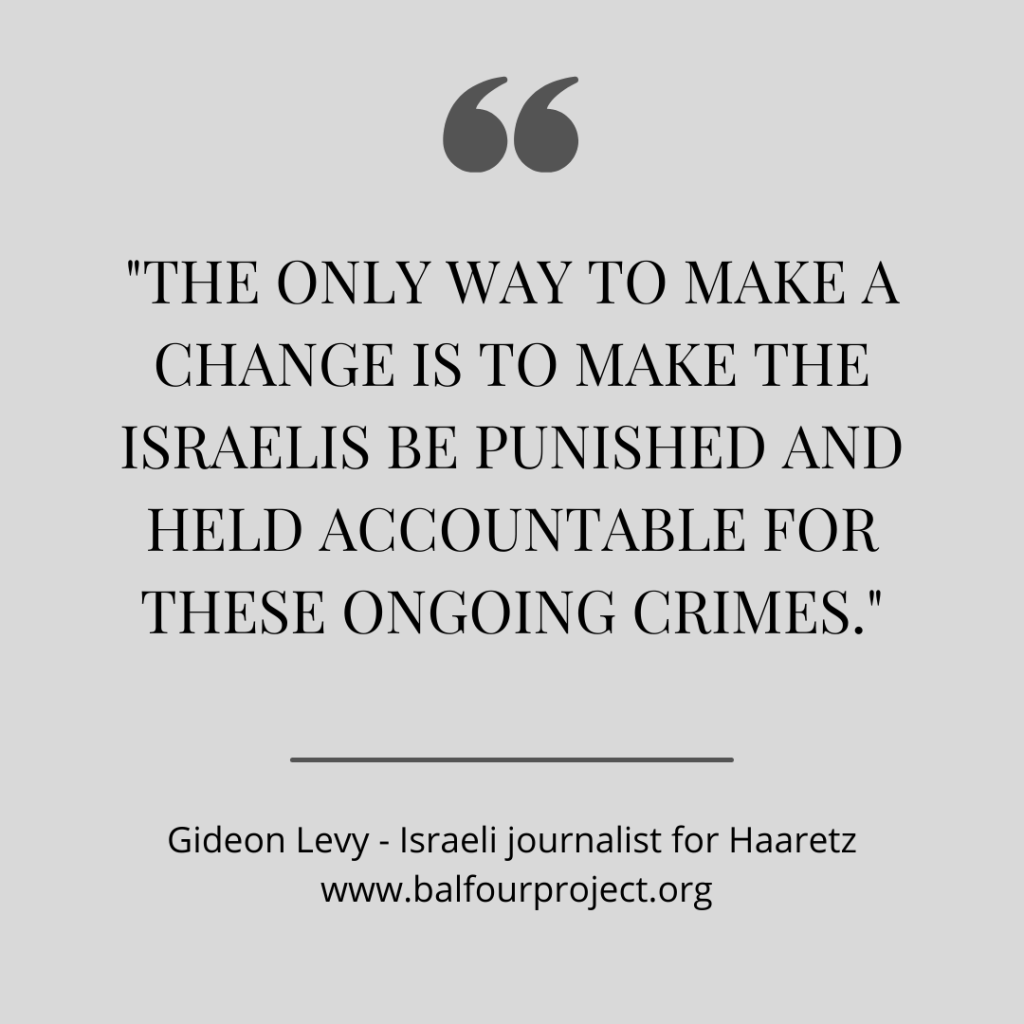
No, because the creation of Israel, I wish it would’ve happened in a different way. I wish so much it would happen in a different way. I wish we could then establish a binational state, and maybe history would look totally different today.
But to say to my father, who came from Europe and was half a year in a boat in the Mediterranean, without any possibilities to get to Palestine, he was not a Zionist, but he left his parents and everyone else wherever he left and came here. He had no other place to go. To tell him, “Go away,” or to tell him, “You did wrong when you came here,” is for me, impossible.
What I can tell my father and his generation, you should have come here, but you should have come here in a different way. You should have come here knowing that this land belongs to another people, and you have no other choice but to join them. But it’s not a land without people and you are not a people without land, who landed in a land without people. There is a people here who lives for centuries and have full rights about this place. This was the major mistake.
Sarah:
So tell us a bit, I’m fascinated to hear what it’s like being you, being Gideon Levy, being such a fierce critic of Israel’s policies towards the Palestinians. I know what it’s like for me being critical from here, but obviously an entirely different set of circumstances. Do you get trolled? I’ve read that you have a bodyguard. What’s your personal life like? How do people treat you?
Gideon:
I will answer you, but I will be very happy also to ask you later on how is it today being a Israel critic in Europe. Because this is becoming more and more complicated and we have to talk about it.
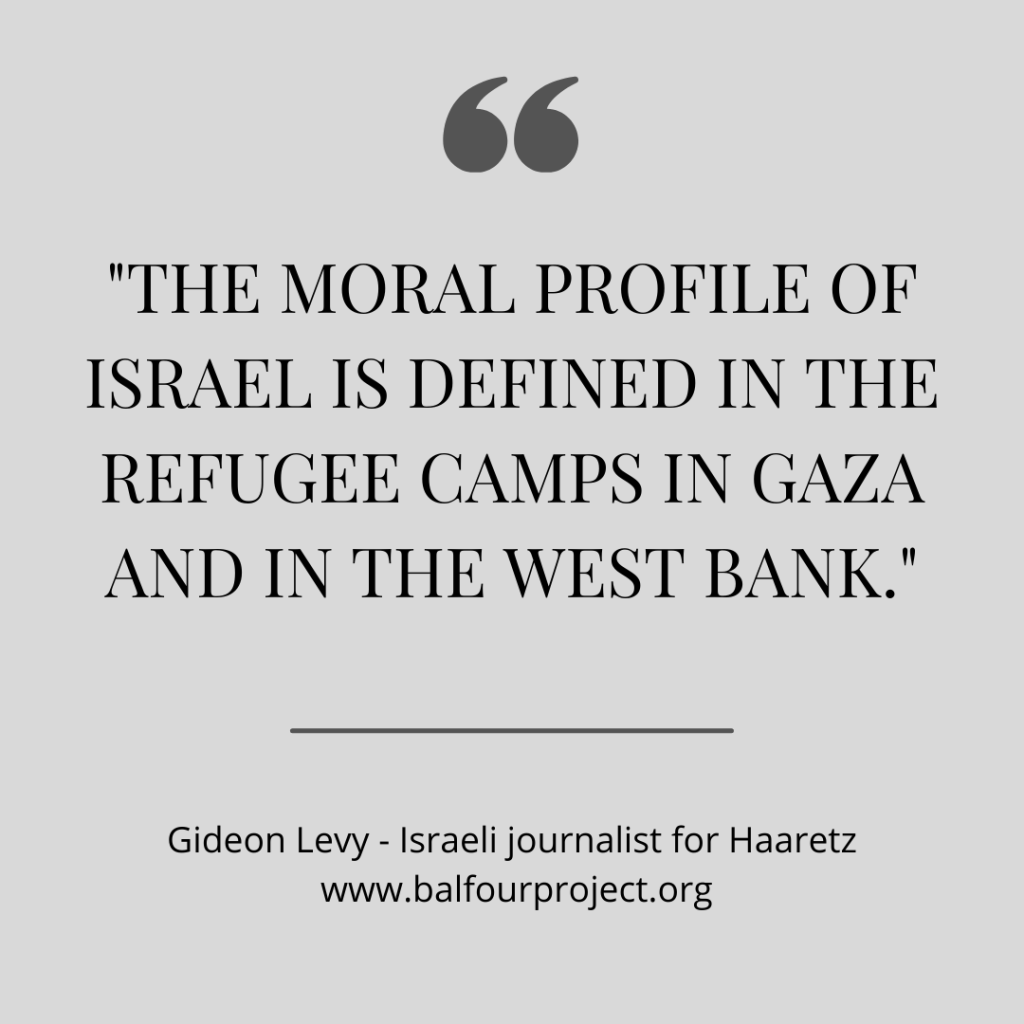
Sarah:
It is on my list. Don’t worry.
Gideon:
Great. So in any case, I am in many ways, privileged. I’m Jewish. I’m Ashkenazi from European origin. I work for Haaretz, which is a very respectable platform in Israel. And somehow I gain some privileges that for example a Palestinian could never gain in Israel, even not an Israeli citizen, an Israeli-Palestinian citizen.
The fact that I’m working for Haaretz gives me so many advantages. First of all, the freedom, the total freedom, which I’m not sure I could have in any other platform. But not only freedom, also support. It’s not only freedom. It’s really support. Not that everyone agrees with me in Haaretz, but having this platform puts me in a different place than any dissident in, I don’t know what, in Russia, or in Myanmar. I am still somehow part of the establishment.
I had dinner with Netanyahu a few weeks ago.
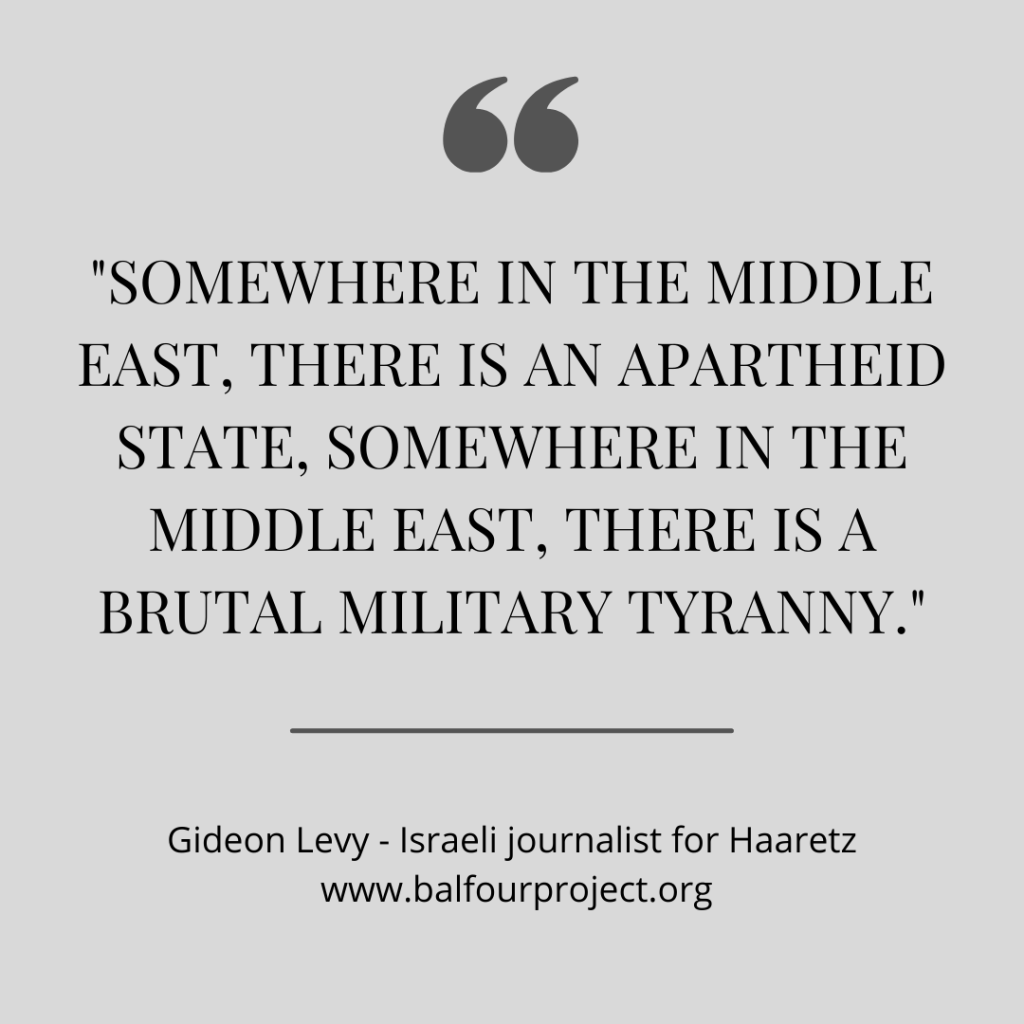
Sarah:
I read about it.
Gideon:
But whatever you think about Netanyahu, I somehow succeeded to stay within in the camp. And this, by the way, talks in favor of Israel, because there is still some kind of spirit of, I don’t know how to call it, but the fact that I am totally free shouldn’t be taken for granted, I don’t take it for granted.
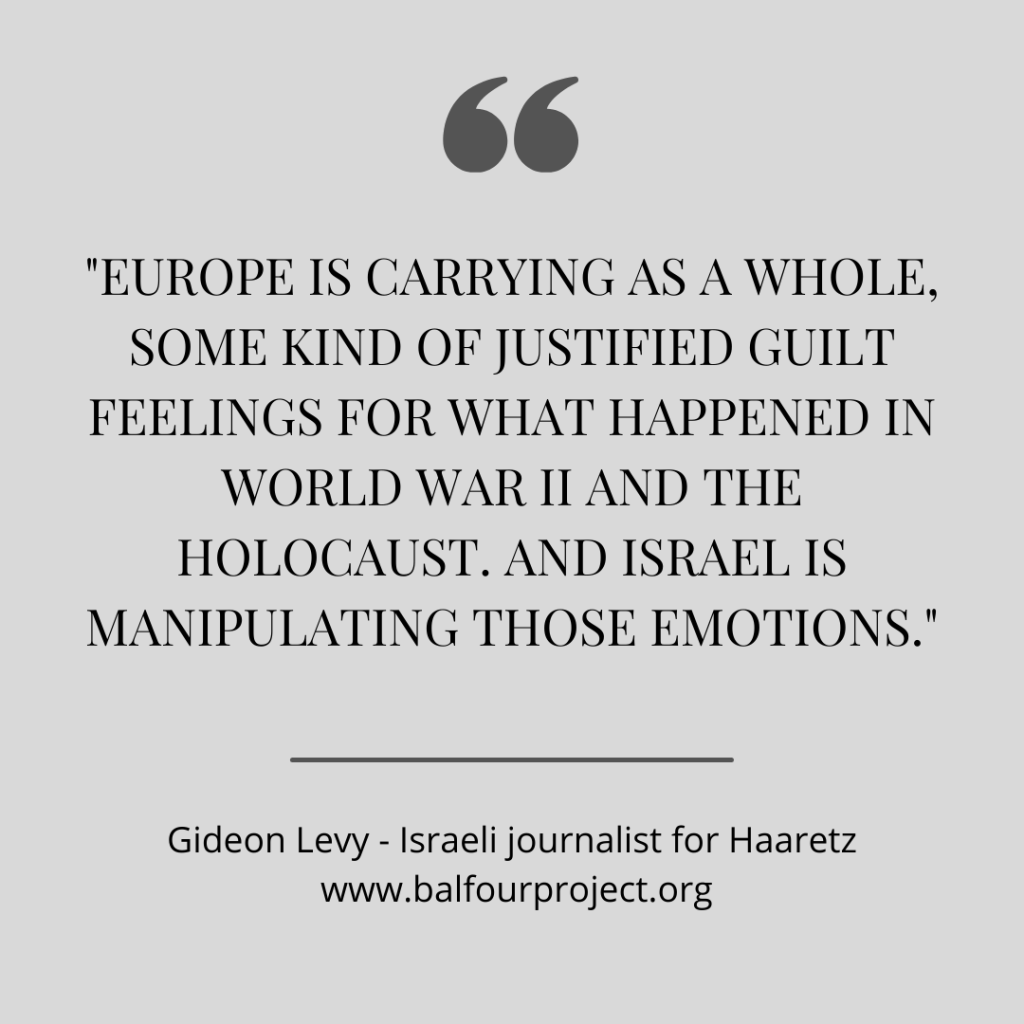
Sarah:
Yet, your government has recently banned or labeled as terrorists, the six, what I have always known as extraordinarily mainstream accepted human rights organisations, including people like Al-Haq and B’Tselem and so on. This has caused huge shock here, I think. It seemed to be unbelievable.
I was going to ask you, first of all, did that take you aback, number one? And don’t you think the next thing we’re going to be reading is Gideon Levy has been silenced?
Gideon:
No, because there is still in Israel a very clear line between what you do to Palestinians and what you do to Jewish Israelis. I don’t say it with pride. On the contrary, with a lot of shame, but the fact is that as long as you are Jewish, I don’t say it will last forever like this, but I don’t see in the coming future that anyone can silence me.
What happened with those six organisations should tell us a very important lesson about Israeli politics, because we are facing now a government of change. We got rid of this terrible Satan called Benjamin Netanyahu. We have now the most leftist Zionist in power. And look what they’re doing, exactly the same. Which should lead everyone to the conclusion that when it comes to the occupation and above all to the Jewish supremacy in Israel, there is no difference between left and right in Israel. Don’t have any expectations from the Zionist left. Where it comes to the real core issues, he’s as right wing as Netanyahu and even more so.
Sarah:
Well, one of my strongest memories from my time as a Jerusalem correspondent, when I was there during Oslo, was of course Rabin shaking hands with Arafat. And the next day I went out with a colleague to Ma’ale Adumim, and the bulldozers were continuing as busily as ever.
Although I’d just like to ask you a question as that’s come up, do you feel that Rabin, by the time he got to the time of his assassination, do you think he was different and that he might have led Israel and the Palestinians finally down some kind of route to peace? Or do you think that was also a pipe dream?
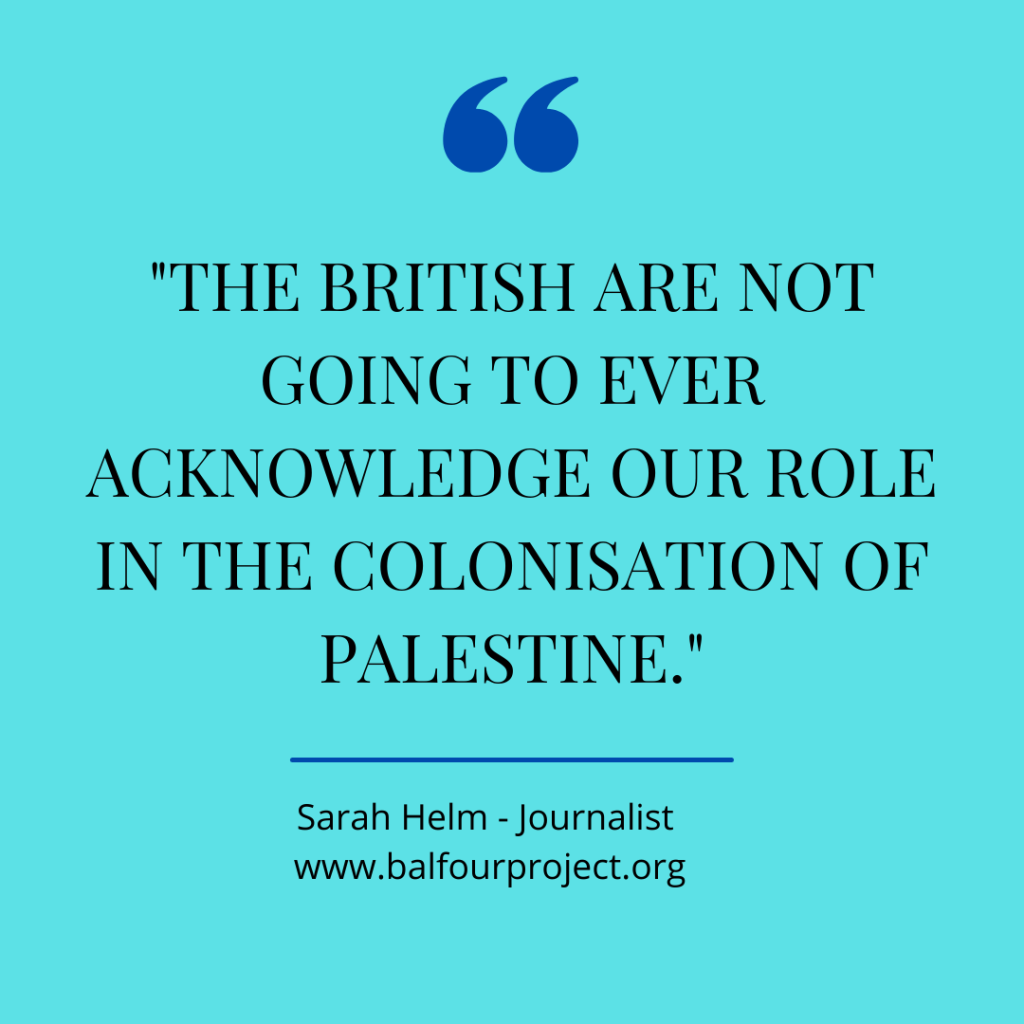
Gideon:
I thought so at the time. I thought that Oslo is a great hope. And when I look backwards and only when I look backwards, I think that Oslo was a trap. And the Palestinians fall into this trap.
You see, take even Rabin who had some goodwill, when he shook the hand of Arafat, everyone was talking about how irritated he was to shake the hands of Arafat
Sarah:
He looked pretty cross actually, I remember.
Gideon:
And it was for him really painful physically. Now, I want to ask you Sarah, whose hands carry more blood you think? Rabin’s hands or Arafat’s hands? Who is responsible for more bloodshed throughout ’48 and ’67 and ’73 and so forth? And above all in the occupation, in their first intifada.
So the fact that Rabin was still a representative of the old school of Israelis, who thinks that the Arabs finally you can’t trust them, and they were all born to kill. And they want only to kick us to the ocean, and they are not equal human beings like us Israelis. They have different moral judgment, and they don’t love their children and all those things. He was part of this school.
Because if he was irritated of shaking Arafat’s hands, it saves the whole story. Arafat was not irritated. Arafat should have been irritated to shake the hands of someone who transferred thousands of people in ’48 from their homes and never let them back.
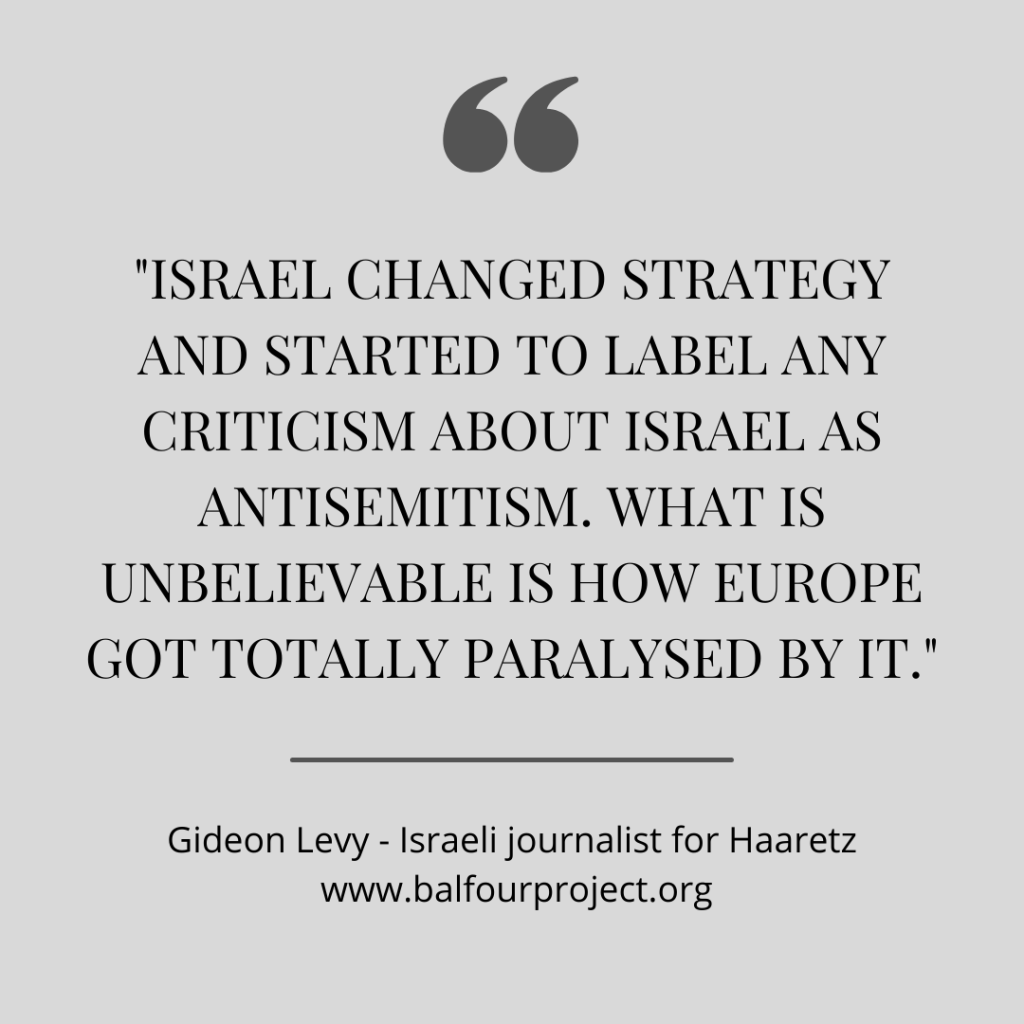
Sarah:
Yes. Well, Rabin was responsible for Lydda and Ramle, wasn’t he? If I remember.
Gideon:
Exactly. Including a massacre.
Sarah:
Right. That’s really, really interesting. Just going back to your own writing though Gideon for a minute, you describe how you have a pretty free hand to do what you do, because you are Jewish and Israeli, et cetera. But nonetheless, I think it would be helpful if you explain the restrictions that are placed upon you.
For example, as far as I know, you can’t go to anywhere in the West Bank. I may be slightly wrong about that, but I’ve seen all the signs as I go around saying it’s dangerous, Israeli citizens enter illegally. And of course you absolutely cannot go unless you somehow smuggle yourself into Gaza. This means that you can’t surely really cover the story as you would like to.
I want to ask you, first of all, how you get around that. But number two, why is it that the Israeli journalistic community and newspapers like Haaretz have not challenged this restriction again and again? Because surely that ban is like being told in any other conflict situation, we’re not going to have war correspondents.
Gideon:
So let’s make some order. In Gaza, there’s no Israeli journalists and no Israeli at all who could smuggle or get in legally in the last 15 years. Ever since Hamas got into power. For me, it’s an enormous loss as a journalist because the real stories are there and the real suffering is there and I’m not there.
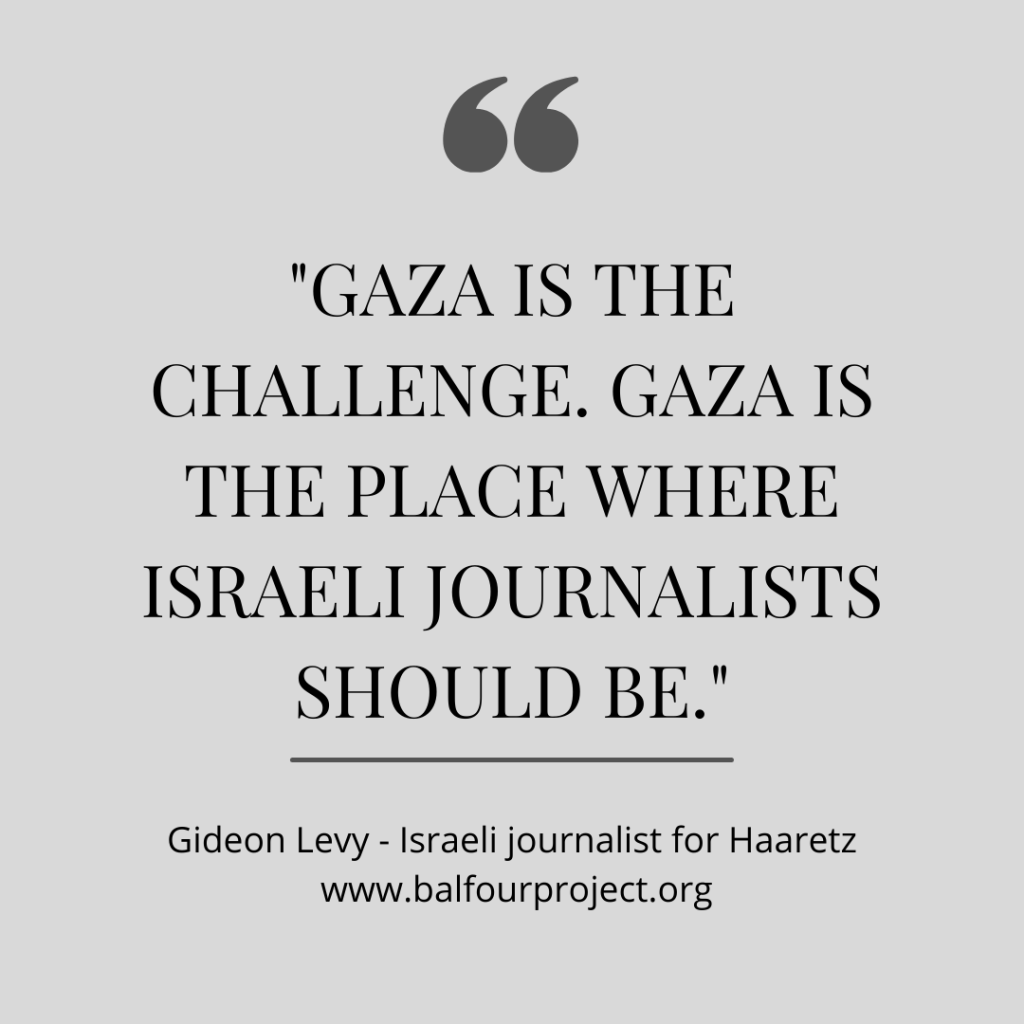
And if I could choose one place in the world in which I would like to visit one more time, it will be Gaza without any hesitation. By the way, journalists can easily go to Gaza and this must be mentioned. If you come with some kind of press card, Israel will let you into Gaza.
Sarah:
Actually I have to correct you slightly on that. It’s actually not easy. It’s getting more and more difficult for multiple reasons. I was actually banned two years ago and told I couldn’t go because I’m actually not a journalist. Even though I’ve been a journalist all my life.
I appealed against the ban and actually I won it. It is actually becoming more and more difficult for British journalists, not least because you have to go through several hoops, through the government press office, your government press office. And most newspapers will not sponsor journalists to go there any longer, because they’ve been made to believe it’s so terrible. You have to do a hostile environment training course before you go in. It’s expensive for them. It’s a high risk. They think you’re going to be taken hostage the minute you step foot there.
So actually it’s really not easy for British journalists to go there.
Gideon:
I think that if a British journalist comes, and he’s on the payroll of a newspaper or media-
Sarah:
Sure, that makes it easier.
Gideon:
Not easier, then they cannot stop you. If you come with a letter from The Independent that you are working regularly for The Independent, you will get into Gaza without too many problems. By this, I don’t… Sorry.
Sarah:
It’s not as easy as it was, but anyway.
Gideon:
Absolutely. But it’s still possible. While for us Israelis, it’s totally impossible. On the other hand, about the West Bank, you are right that there are those big signs that warn an Israeli not to get into Area A, the cities, but I can tell you for 32 years now, I’m going every week to the West Bank and I was never stopped. And if I was stopped, I always found ways to get into the West Bank. I have no problem today to get into the West Bank.
Yes, I violate the Israeli law, but nobody talks about it. I’m every week in the West Bank, very easily, very easily. This must be said. It’s not enough for me, because Gaza is the challenge. Gaza is the place where Israeli journalists should be. But in the West Bank, I’m still very free to move. Yes, from time to time, I lie at the checkpoints. I tell them I’m going to a settlement. It shouldn’t be like this. Absolutely.
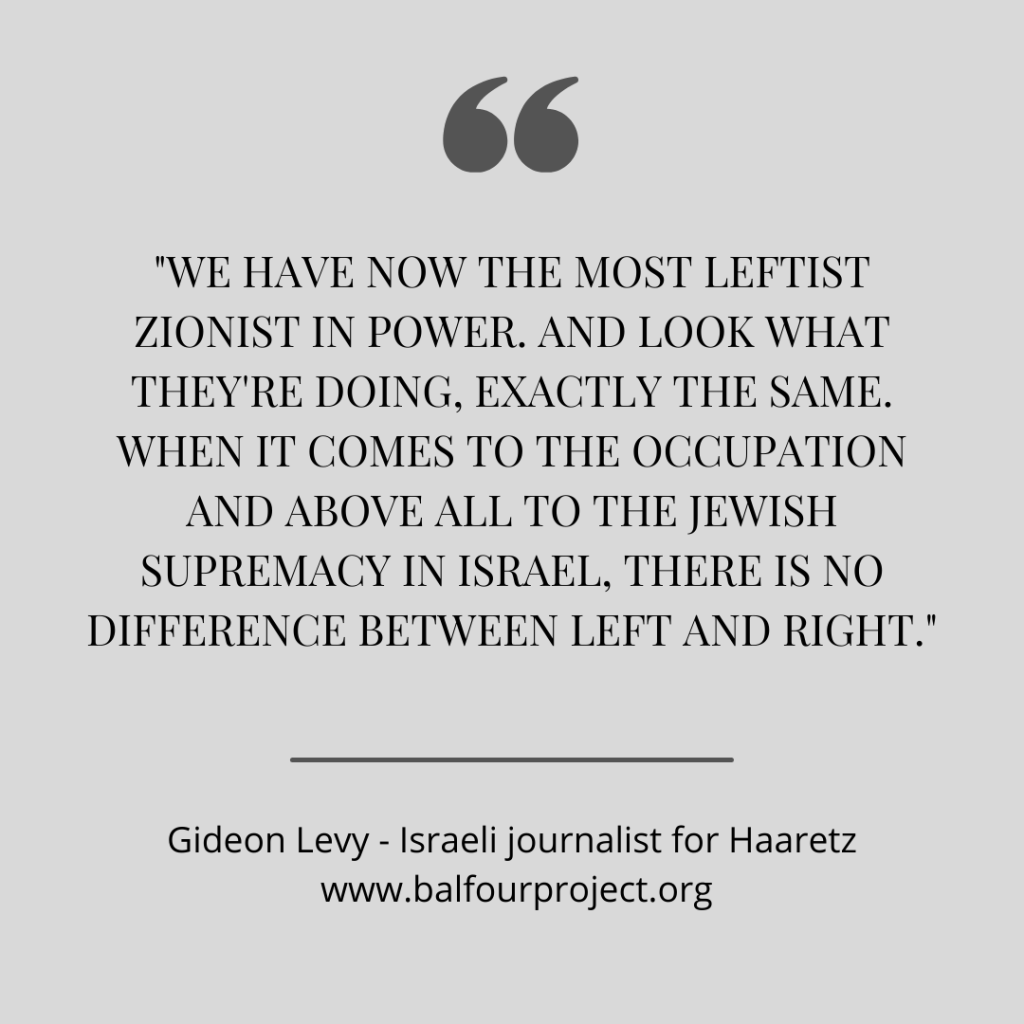
But I don’t remember one time, even not in the worst times in the intifada, in which I couldn’t make my way to a story in the West Bank.
Sarah:
Has anyone in the Israeli press world challenged legally your own government’s right to keep you out of Gaza completely?
Gideon:
So first of all, most of the Israeli journalists are not interested to go to Gaza. And most of the Israeli journalists have no interest to know what’s going on in Gaza. It’s enough for them what the army spokesperson is dictating them. This is part of the problem that Israeli media is free, but totally taken hostage by the readership and the rating and the viewers who don’t want to hear about all those things. And therefore, there is no interest for anyone to do more than getting the briefings from the army spokesperson.
My newspaper tried to challenge it, including an appeal to the Supreme Court. We didn’t succeed until now. They have the claim that if I will be taken hostage there, kidnapped, then the state will have to take some measures. I’m ready to tell my state that I release it from any kind of responsibility. I go to the West Bank. It might happen also in the West Bank. I don’t want any favors from my state, but it doesn’t work with Gaza.
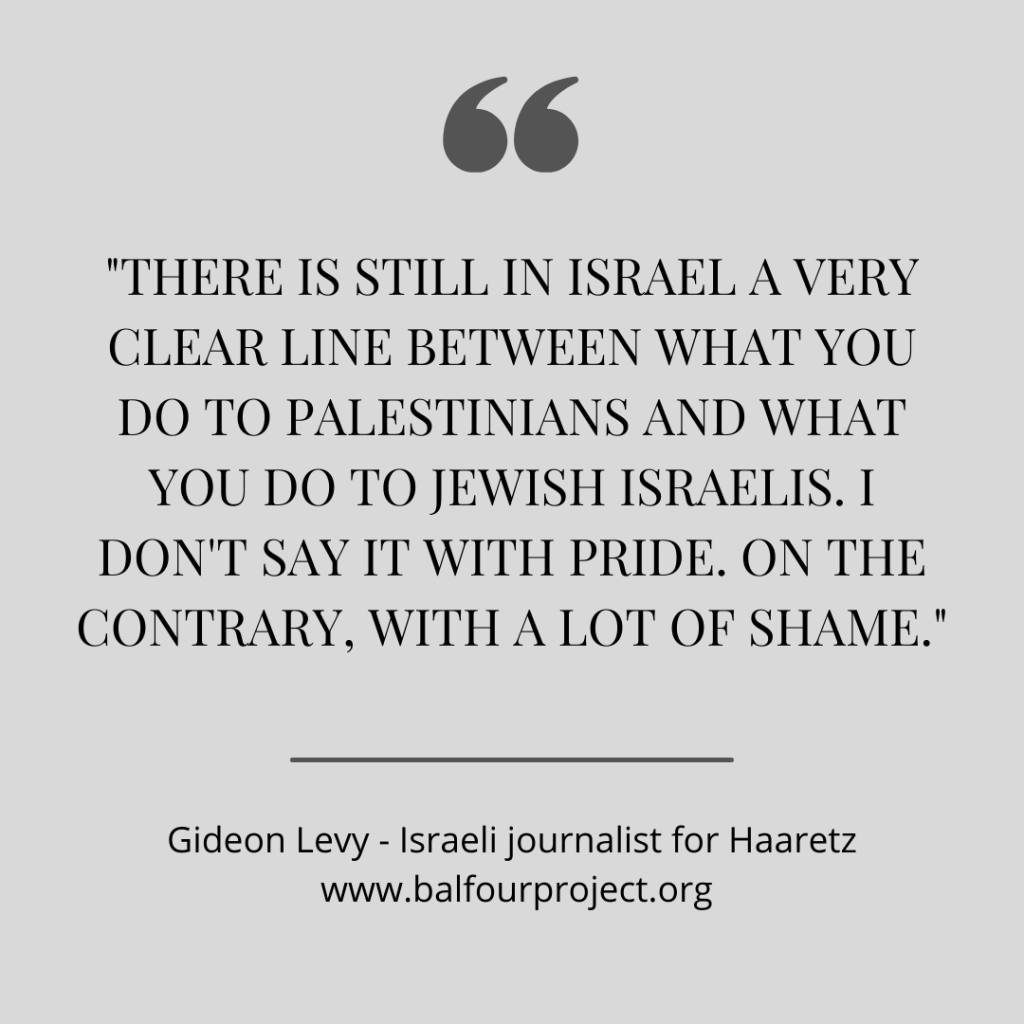
I must tell you that except of me and my photographer, I don’t think many people regret it.
Sarah:
Can I just switch now to asking you a bit about the British and European support for the arguments you’re putting? Presumably, I’ve often thought this, when we have our debate here that we’ve recently become hugely embroiled in over antisemitism and so on, that people like yourself, I assume, would be hugely grateful for much more criticism of Israel, along the lines that you set it out, not less.
And yet, we have found, particularly if you look at what’s been going on, and first of all in Jeremy Corbyn’s Labour Party and Keir Starmer today, that they have become so cowed by the fear of anti-Zionism being conflated with antisemitism, that Corbyn has been put in his box and Starmer hardly dare mentioned the word Palestine.
And journalism has also been undoubtedly, even in the last I would say two to three years, I’ve offered at least two pieces to The Guardian, which they said no to, because it was too sensitive because it broached some of these issues.
How does that look to you? And would it not help you more rather than less, if people spoke out loudly here?
Gideon:
I think this is maybe the most important subject that we can discuss today, because what happened is really unheard of and unacceptable In the last three, four, five years, Israel changed strategy and started to label any criticism about Israel as antisemitism. What is unbelievable is how Europe, entire Europe got totally paralysed by it.
It’s unbelievable. In Sweden, you cannot publish a critical article about Israel today, because you’ll be labeled as antisemite, and same in your country and same everywhere. I’m not speaking only about Germany, which goes without saying.
A few years ago, I was invited to a small meeting of solidarity, totally innocent solidarity group with the Palestinians in Berlin. They couldn’t find a venue. We had to travel 200 kilometers to a Copt monastery where the Egyptian or the monk was ready to host us for a weekend. Because in Berlin, nobody will give you a venue to speak about the occupation or to take some solidarity with the Palestinians.
So this is really more your issue than our issue. Because I think we are dealing now with freedom of speech in Europe, and freedom of speech in Europe is damaged seriously by those accusations.
Sarah:
The taint of antisemitism seems to be nowadays, often rightly so, I’m not contesting it. My last book was about a Nazi concentration camp, but it seems to be now so deadly to editors, to politicians, to anybody that nobody dares set out the case for separating antisemitism from anti-Zionism.
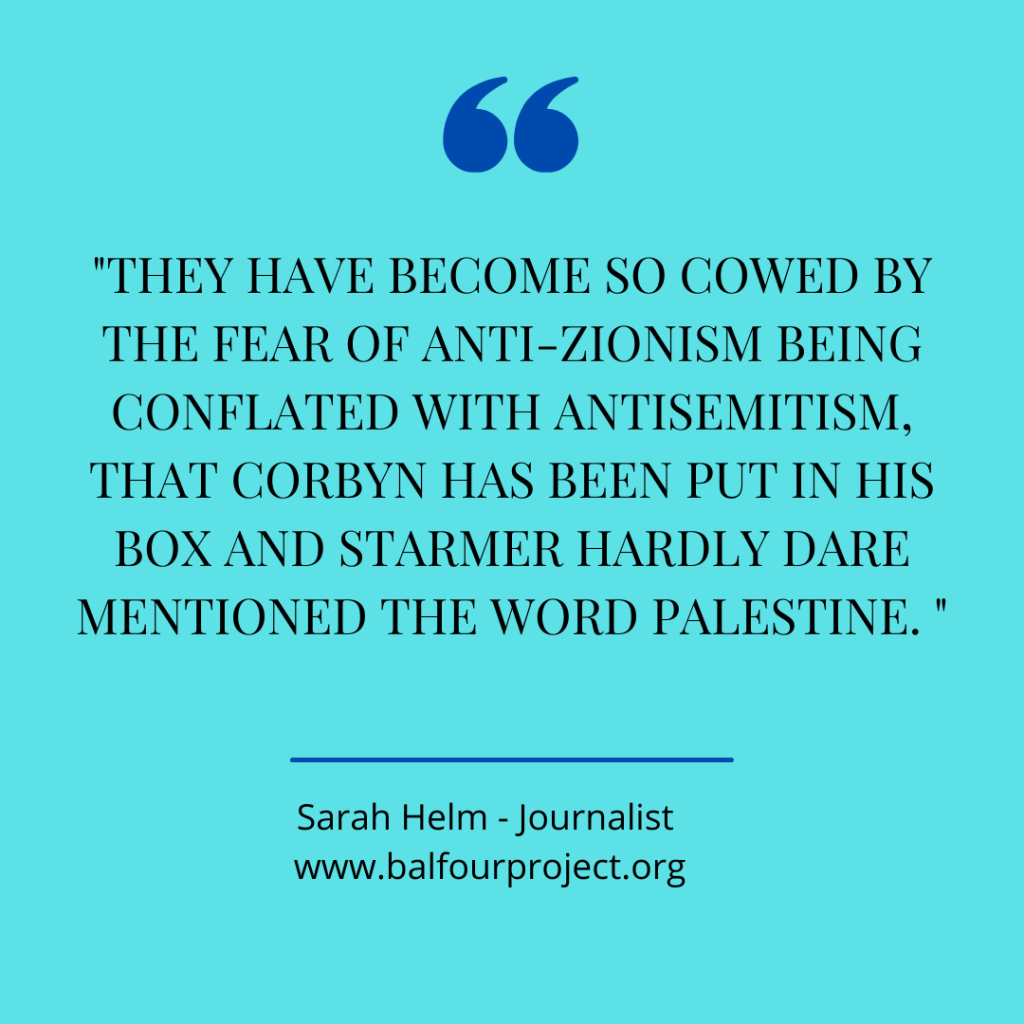
I want to ask you why you think we have less courage to do that than we did in the ’50s and in the ’60s when we were closer to World War II, for example? If you look back through the all the debate about Zionism that’s gone on over the years, people were much more open and much more frank and much more ready to distinguish publicly and in debates in the commons and in the press between the two. Why is it now that we are so, so terrified apparently by being slurred as antisemitic?
Gideon:
I think first of all it is because of the success of the Israeli strategy. They do it systematically, deliberately, working through the Jewish communities, through the embassies. You publish a letter to the editor and immediately the editor will get a phone call from the embassy, from the Jewish community, “How dare you,” and so forth and so forth. And we know they’re quite powerful and influential, even in places where there is no reason for guilt feelings toward ’39 – ’45 and also no big, meaningful Jewish community. And still, you see they’re paralysed.
I’m really referring to a place like Sweden, but Europe is carrying as a whole, some kind of justified guilt feelings for what happened in World War II and the Holocaust. And Israel is manipulating those emotions.
Here, you have to add one more thing, which is new and this is the Islamophobia. Don’t forget that 20 years ago, there were not so many Muslims in Europe. And Europe doesn’t like those Muslims, to say the least. And Israel is manipulating this as well.
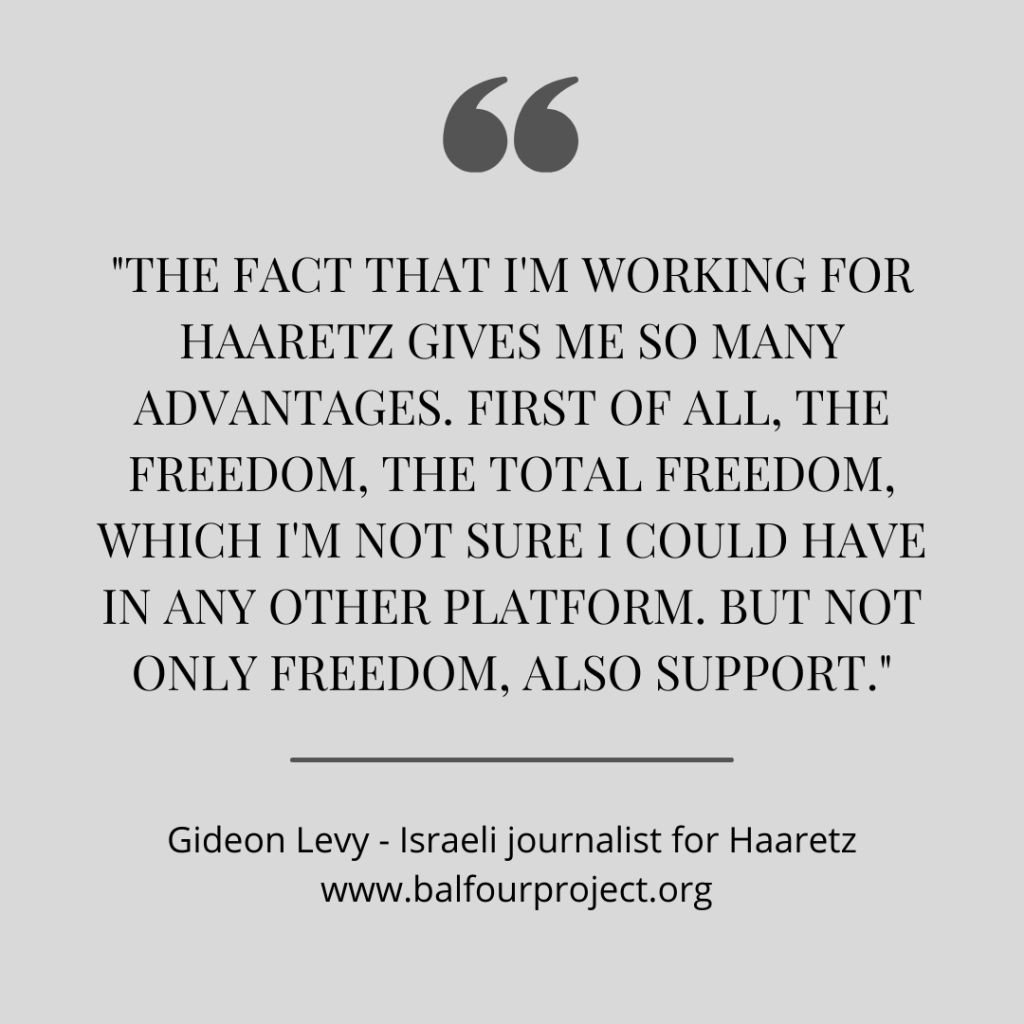
So by the end of the day, our hope, my hope, the few Israelis who have this hope, not only because you were talking about criticism of Israel, no, we were not expecting criticism of Israel. We were expecting taking measures, because criticism, Israel got enough and Israel learned to live with it and ignore it.
Sarah:
Sure.
Gideon:
What we were expecting is taking measures similar to those which were taken towards South Africa.
Sarah:
Yes.
Gideon:
And this not only never happened, I don’t see a chance that it will ever happen. This was our last hope, because for Israel, nothing will change. Inside Israel, there will be no change.
Sarah:
Curiously, I actually had a long briefing with a Foreign Office official before I came out, for my first trip to Gaza for many years, after the 2014 war. And they were actually talking at that time about possibly, and I know it’s small beer, but it’s the beginning, sanctions against some of the settlements. Even to say that now is a joke. Instead, they’re banning Hamas, they’ve turned Hamas into an organisation, which even its political wing is now to be deemed terrorist.
Anybody like me or whoever, who has any sort of dealings with them at all will be criminalised. What do you make of that? What reaction has there been in Israel?
Gideon:
This is part of this unbelievable policy. The world is talking to Taliban. The world is talking obviously to Iran. The world is talking, because that’s the way to solve problems. And Hamas is… The EU totally bans Hamas. Why? Israel did anything possible that Hamas will get stronger and will run Gaza. Hamas is running Gaza today. We can like Hamas. We can dislike Hamas. Gaza is Hamas and Hamas is Gaza.
What do you mean you don’t talk with them? You talk to Israel, so you talk to Hamas. I don’t want to make a moral comparison between Hamas and Israel, or between the Palestinians and Israelis, but it’s a very complicated comparison.
And when it comes to talk about terror, let’s not get into this alley in which we have to decide who is a bigger terrorist, the state of Israel or those organisations who would love to fly an F-15 and push a button and throw bombs over civilian neighborhoods in Gaza… Unbelievable phenomenas, which I’m speechless. I don’t know what to say. I don’t know what to say about this world, who doesn’t talk to Hamas and talks to Taliban and talks to Israel.
Sarah:
Nobody knows what to make of it. It’s extraordinary. Well, let’s see how long it sticks.
Sarah:
I wanted to just take you back in time a little bit as well. As you know, there’s this extraordinary attempt to control the narrative on the part of Israel, this is nothing new. It’s gone on since the year dot. And of course, controlling the narrative about what happened in 1948 has always been absolutely central to what story is told of history there.
I’m wondering, a lot of what I’m doing at the moment is around 1948. I feel like as I write about events in 1948 and things come up on my screen, it’s all a continuum. As we know, the Nakba never stopped. Nor did the attempt to control the narrative of what happened then, change really much from how it is today.
But I wondered how concerned you are by, and how concerned actually you think the Israeli government is today by the fact that the story of 1948 is coming out of the woodwork more and more, there are more exposures. It is something again that the Israeli press and organisations are doing, and they are trying to, as far as I understand it, the Israeli authorities are trying to take, I’ve been told this by Benny Morris himself, the well known historian, that things he was able to access in the late ’80s about what happened in 1948 are now being taken out of the archives and reclassified.
What do you make of that? And how worried do you think that the Israeli government really is about the fact that some of the crimes that were committed there, the criminal way in which you, I think you agree, the state of Israel came into being is now being covered up.
Gideon:
My newspaper Haaretz is publishing tomorrow, Friday, a big investigation about what happened in Deir Yassin. I didn’t read it yet. Deir Yassin was the most famous massacre, claiming that it was not the only massacre and that’s very important.
But I must disappoint you, Sarah. I think that the problem is the indifference. The problem is that even if those stories will come out, even if the world and Israel will know everything about ’48, today, the sensitivity to all those stories and issues is much, much lower than 20 years ago or 30 years ago.
And therefore, I don’t think that the government cares so much. For many years, I felt how most of the Israelis feel that something is burning under their legs, under their feet. Because almost every Israeli who was here in those years knows the truth and knows that something went wrong. Something went wrong in this country, in the establishment of this country.
And therefore, they were so aggressive against any kind of attempt to say the truth, to tell the truth. Therefore, they were so aggressive in covering up physically all the ruins of the Palestinian villages, no signs, nothing. They were not here. They were never here. Nothing stays except of some sabra, some cactuses, which remind us, and some very few ruins, which remind us that there was a people living there.
Now, it’s a new era, because now indifference is the main sentiment.
Sarah:
You say that, and obviously you know better than I do. You live in the country. I travel around there a little bit, but I wonder whether that’s entirely true. I’ll give you a small example. For some reason or other, I was in Rehovot, which people won’t know, this is a town south of Tel Aviv, not so long ago. I had to get a taxi from Rehovot to Gaza, to Erez checkpoint, which is the main checkpoint you go into Gaza from crossing, from Israel.
I’ve got taxis to Erez checkpoint from Jerusalem and all over the place, but this was from Rehovot. I’d actually been looking at destroyed Palestinian villages around Rehovot at the time. And there was a very friendly guy, with the reflective sunglasses. And he said, “Oh, yes, I’ll put on Waze and we’ll go to Gaza.” So off we went and we had the Waze, but Waze just broke down about literally, I don’t know, 500 yards from the checkpoint. And he was terrified and he stood up and he said, “Where is Gaza? Where is Gaza? And what’s happened?” And I said, “Don’t worry, Dan, it’s fine. It’s just round there.” And I showed him how to get there.
Then we got there and he was astonished. He said, “Is this Gaza?” And then he saw some people coming out, because a few old people and small numbers of people are allowed out to visit relatives. And he said, “Is that what they look like in Gaza?” And I said, “Well, some of them look like that, Dan.” And then he started telling me about how he’d never been told the truth and was it really like that and were there really villages like Majdal that existed? And he asked me to have him pick him up when I came out, because he wanted to know more.
Anyway, I tell that only to say there are so many wonderful, decent people there who if they understood and their education was right, I’m sure they’d care. They’re not all people who are not human, Israelis, any less so than Palestinians.
Or am I an old sentimental, like Avram Berg told me I was?
Gideon:
No, first of all, it’s important to be also sentimental, because it is also a sentimental issue we are dealing with. It’s not only politics and strategy. Finally, it’s the fate of millions of people who are suffering like none of us can even imagine itself. For sure in Gaza, but same for the West Bank. So being sentimental is important. Don’t apologise for being sentimental.
I just think that Israeli society and same for Europe in many ways, went through a process in the recent years, in which this is not on the table anymore. Europe has different issues now to deal with. I feel how Europe is losing interest, and Israelis who were very nervous before and very ignorant, but very nervous not to know too much. Now, there’s a new state, which is much more dangerous, because so what? So tell them that there were massacres in ’48.
I’ll give you one example, Sarah. In the late ’80s, I wrote about the first pregnant woman who gave birth in the checkpoint. She tried three checkpoints to get to a hospital. They wouldn’t let her in and she lost her baby. He died, but she walked two and a half kilometers in a rainy, cold night and she lost the baby.
When I first published it, there was really, I don’t want to say a big scandal, but it got to the cabinet meeting, some officers were brought to justice. It was an issue. Today, if I write the same story, nobody would care. I don’t know want to say nobody. Because there are still Israelis who are conscious, but very few would care anymore.
And same for the big issues. They world somehow trained itself to live with the fact that there are daily crimes in this part of the world-
Sarah:
Surely, I accept that. And in a way, Gaza, it comes back to Gaza as I know this applies to all the refugee camps in the West Bank and everywhere else, but there’s something about Gaza. As you know, your own newspaper wrote only a couple of days ago, how they finally completed this new, huge wall and fence around Gaza, which goes so deep into the ground. I saw them building it when I was last there, to stop the tunnelers.
Behind which live 2.2 million people I think it is now. Now those people are not going to go away. They’re going to stay put. Some of them may go away, but the number’s not going to diminish. They’re talking about building an island as you know, off the sea, to put them in or something like that.
In view of the fact that the human results of this stalemate is not going away, indeed, it’s going to grow, as is the challenge to the world to support them and so on, I want to know where you see the future here, Gideon. Because I interviewed a wonderful man called Jacob Sharett, who I think gave an interview to Haaretz recently, who I just tell everyone else is the 92 year old son of Moshe Sharett, then Chertoff I think, second prime minister of Israel.
But Jacob is a very, very disillusioned 92-year-old. He doesn’t say he’s an anti-Zionist, he says he’s not as a Zionist. He basically envisages little short of catastrophe, of huge violence in five, 20, 30 years. It’ll only end in some huge conflagration. Do you agree with him or do you see some kind of peaceful route without bloodshed whereby this is resolved?
Gideon:
Unfortunately Jacob Sharett is more optimistic than me, because he foresees violence, and I foresee continuing with the same thing for maybe decades. For many years, I was totally convinced that this will explode one day, because history taught us that finally, peoples who are fighting for their freedom, finally they make it, but not in all cases.
Look at the Native Americans in the United States. I’m very afraid that the Palestinians might expect a very similar fate or a very similar future in which you know they will be put in those bantustans like they are today. The world wouldn’t care too much. Israel is strong enough to continue with this.
And really my hope for many years, that one day the world will interfere. Now, I don’t see who is going to interfere exactly.
Sarah:
No one state solution. We’re taking it as a given there’s no two state solution, but for you also no one state solution either.
Gideon:
There is a one state, but it’s not a democracy. And the question is, will the world react like did react to the first apartheid state or not? Because today two things are almost not questioned anymore. First of all, the two state solution is dead. Those who claim that there is still a chance, do it, because it’s very hard for them to admit the truth, but deep in their heart, including European leaders, they know that there is no chance. After 52 years, really, give us a break.
And secondly, this illusion that an apartheid state is unacceptable. No, it is acceptable for many years. I thought now, I’ll be very extreme now and provocative, but I really think so. I saw this Crown Prince, the Saudi Crown Prince, he’s now banned. And the Macron went to see him. This was a big revolution because he murdered, or he’s responsible for murdering one journalist.
How many people, the Israeli politicians are responsible for their lives, for the murders, for the assassinations? And why are there so legitimate? There is no one more legitimate today.
If an Israeli politician wants to travel anywhere, he will be most welcome everywhere in Europe, in the United States, in Africa and Asia, everywhere.
Those people are not brought to any kind of accountability for what they’re doing.
Sarah:
It’s a very, very, very bleak prediction and extraordinary. I’m very glad to hear you make it, because it’s been in the back of my mind, but I’ve never articulated it like the one you did. In other words, we’ll just have more of the same.
Just last thing, and I know Diana will want to ask questions, but quickly, as this is the Balfour Project, one thing that has really struck me traveling around in Gaza and talking to obviously particularly the old people, because I’m trying to get the last survivors of 1948, but also younger people. And Israelis always say, “They hate us. Arabs, they hate us.”
Actually, I don’t think that’s really true. The people they hate most, well, they don’t hate ordinary British people. They’re always lovely to me and the people who visit. But the thing that angers them most is what the British did. They are more angry with the British than with the Jews.
And the Balfour Declaration obviously is, the Balfour promise as they rather sweetly call it, the Balfour promise is what they revile in a way more than anything else. Do you think that it’s time that the British, and would it be a good idea, I admit it’s not going to happen in the near future, but if we came to terms with that somehow, like we’re coming to terms with other colonial legacies that we now admit were not really how we want to remember ourselves?
Gideon:
Look, I was brought up in Israel in which they taught us that the Brits were anti-Jewish, antisemetic and anti-Zionist. And they did anything possible to prevent the establishment of the state of Israel. Only now years later, I realise that if there was a main role for the Brits, it was to support the Zionistic project, with some exceptions.
The fact that, again, coming back to the beginning of our conversations, coming back to my father, he in ’39 couldn’t get to Palestine. And the Brits sent him to Beirut to a detention center for two months, which was also problematic, because those were refugees who were running for their life from burning Europe or from Europe which started to burn them.
In any case, I think that looking at the past, Balfour, Nakba, for many years, I thought this is not productive. Let’s look for the future and forget about the past. But the past and you mentioned it before, the past never stopped. ’48 never stopped, Balfour Declaration, which gave some privileges to the Jew over the Palestinians. Let’s face it, read the text.
Sarah:
Huge privileges.
Gideon:
Huge privileges, while they were the natives and they were the newcomers, with all the respect to the heritage and to the Bible and to everything. Finally, we were the newcomers and they were the natives. The Jews could come to Palestine for centuries and they didn’t do so. For centuries, no Jew came here.
Sarah:
But the British are not going to ever, not in the current climate, even with the knocking down of statues, even with all the talk about the crimes of slavery, we’re never going to acknowledge our role in the colonisation of Palestine.
Gideon:
But everyone is dealing with his own guilt. I think that’s our guilt, we, the Jewish Israelis carry so much more guilt toward the Palestinians than you carry. I can give you a discount.
Sarah:
Thank you. All right. We’ll let Boris Johnson off the hook then, and not ask him to apologise.
Gideon:
Exactly.
But what do you get instead? They killed Corbyn, so who’s left? Imagine yourself that Corbyn would’ve become Prime Minister of the UK. I think it could have become a game changer in Europe, because it could lead some others.
Sarah:
The trouble is that’s what your government thought as well.
Gideon:
That’s true.
Sarah:
Well, I better stop there. We could talk forever, but Diana, I’m sure you’ve got lots of questions for people to ask Gideon.
Anyway, thank you so much. That was really, really interesting.
Gideon:
Thank you so much for your kind and interesting questions, Sarah.
Diana:
And so now I will ask you some of the questions. I’m going to start Sir Vincent Fean who’s the chair of the Balfour Project.
Gideon, all your professional life, you’ve been telling it like it is. You deserve respect. What is the best thing for British civil society to say or do, that will resonate with Israeli civil society and influence thinking towards peace with justice?
Gideon:
Look, if anyone expects that the Israelis will wake up one shining morning and say, “Oh, the occupation is not so nice. Let’s put an end to it.” It didn’t happen for over 50 years and it’s not going to happen in the coming 500 years. The only way to make a change is to make the Israelis being punished and being accountable for these ongoing crimes.
And the only way will be when Israelis will have to pay. I’m not speaking about money, but will have to pay for the crimes. And then Israelis will ask themselves, is it worth it? Are we ready to pay for those stupid settlements that we have never gone there and have no interest in what’s going on there? Is it really logical that we will pay now a price for it, a political price, a diplomatic price, even a price in our identity?
But that’s exactly the role of the civil societies, because governments are not going to do it. Only civil societies are going to do it, to make Israelis accountable for what they’re doing.
Diana:
Thanks for that. I’ve got a question for Martin Linton. Can Israeli politicians believe their luck that they have such weak and unprincipled politicians as Boris Johnson and Joe Biden in charge of the West?
Gideon:
And whom do we have in Israel? This is an era of weak politicians. And really, and we had also stronger politicians and when it comes to Palestine, Israel, they did nothing. So it’s not now about looking for this hero, who will make the difference. We had Barack Obama. Really, who else had this understanding of the Palestinian problem? There was never an American president who understood so well, the injustice for the Palestinians. And what did we do? Nothing, but really nothing.
We shouldn’t look for a messiah who will come and save us. It must come from the civil societies. Like it came by the way with South Africa, always put in your mind, how did the apartheid system in South Africa fall? Finally, it was about the international sanctions and embargoes and boycotts which brought an end to it.
Diana:
Thanks for that. I’ve got a question now from Ronald Mendel, a question for Gideon, what do you think about the argument among some Israeli British and American Jews, that Judaism needs to be reclaimed from Zionism, for the actions of the Israeli government against Palestinians is incompatible with the moral and ethical values of Judaism?
Gideon:
I don’t know what are the moral values of Judaism. I know what are universal morals. I don’t accept this notion that there are Jewish values and some other values. No, there are moral values. And there are global values, universal values, and those moral values are very clear. You don’t occupy. You don’t tyrannise. You give equal rights. And above all, all human beings are equal. And this, you don’t need to be a Jewish or a non-Jewish to believe in it.
By the end of the day, Zionism is an ideology. You can stick to it. You cannot stick to it. But it’s impossible to believe that if you resist against Zionism, immediately it criminalises you. And that’s the fact today. If you say one word about Zionism, you are criminalsed as an antisemite.
This is unacceptable. And this, the civil societies in Europe should say their word, “No, we don’t accept it. We have the full right to criticise Israel, to be an anti-Zionist. Hey, we are not antisemites.”
Diana:
And now we’ve got a question on the media, which I think both of you could chip in on, from Tim Llewellyn, who is a member of the Balfour Project and a former journalist. Why are the British media, including the BBC, so dishonest about reporting Israel’s oppression of the Palestinians? For instance, Israel’s periodic invasions of Gaza are always accepted by the UK media as responses to Palestinian violence, which they know not to be the case.
And a follow-up question from Heather Formaini who says she would like to follow up from Tim’s question. How does one approach the BBC to interrogate the poverty of the quality of broadcasting on Palestine? What can we do?
Gideon:
It’s for Sarah.
Sarah:
Well, there used to be wonderful correspondents who used to cover this subject for the BBC. And of course, there are some, there still are, but we don’t hear from them very often on this subject. I frankly have to turn the radio off when the BBC covers Gaza particularly, or the West Bank, particularly the main news programs.
There seems to be, they’re tied into two things, it seems to me. One is this balance thing, which projects across all coverage of all subjects, but every single time, you’ve got to balance it by equal time and equal force. You’ve got to give the Israeli point of view and the Palestinian point of view. That’s one thing.
But they don’t seek out, I don’t know how many times Gideon has been asked to speak on the BBC. How often do they call you up, Gideon?
Gideon:
Almost never. Really, I can’t recall when was the last time.
Sarah:
There you are. How absurd. The BBC recently went into Gaza to do, I think it was about two years ago now to do some kind of story about Hamas. They interviewed Mahmoud Zahar, who was one of the most inarticulate, the most radical of the Hamas leadership. And this was the point of view we got from Gaza. It told people absolutely nothing about the situation of the 2 million people in Gaza. They seem to not be able to get articulate voices on from the Palestinian side, and they seem not to want to try.
Now, we know perfectly well that the BBC has been very badly cowed and got at and sat upon by the pro-Israel lobby in this country over the years. Many notorious cases, going back to Jeremy Bowen. There was an entire inquiry about his coverage, which was said to be anti-Israel.
I think, I’m afraid I just get the impression with a few notable exceptions that people are terrified of stepping across the line, of losing their jobs, of being demoted. And the management as Gideon has already said earlier, are terrified of getting the calls from the Israeli embassy and indeed from the British government, from Priti Patel at the moment. They’re terrified.
The only thing I’d add on that is that I don’t think it’s just that there’s this terror. I’m actually not sure how many people really know the real story themselves inside the BBC. I think the experience of people like Tim Llewellyn, who’s asked the question himself, is dissipating. I get the impression that, and of course there are very many exceptions to this, but the depth of knowledge and understanding of the kind of issues that Gideon has been explaining, is going.
And I think again, they take what the Israeli government spokesman says.
Gideon:
And you know what’s the biggest joke, that in Israel, BBC is perceived as an antisemite network.
Sarah:
Of course, because the lobbying is working brilliantly. It’s just giving such an easy ride.
Gideon:
And the BBC can only defend itself and apologise all day long, because he’s accused as an antisemite. That’s the manipulation. And that’s exactly the point where civil societies shouldn’t say, “We accept it.”
Diana:
So following on from your comments, Sarah, where you asked Gideon how often he’s asked to speak at the BBC, we’ve got a question from Pamela Manning who asks Gideon, are you often asked to speak or take part in debates at Israeli universities?
Gideon:
Not at all, but things change in this country and it’s not only about me. It’s really about losing interest in the entire issue of occupation. I would even broadly then say it’s even losing interest in anything which is collective. Israel is becoming a society, a very individualistic society. Very ignorant, really concentrated in stupid programs, reality programs on TV, all kind of fake scandals who are never important. And really most Israelis don’t deal anymore with any kind of serious issues. Israel changed.
Diana:
Well, we’ve got a comment that sums it up from Afif Abu Rish, very depressing picture from Gideon Levy. What does he suggest the Palestinian people do?
Gideon:
Here, I have only one suggestion, not that I have magic for them, but I think the Palestinians should really leave all the slogans about a Palestinian state, about settlements, about borders, about all those things. Concentrate in one thing, struggle over equal rights. One person, one vote. This should be the only discourse. Go for it without any hesitation. Challenge Israel, make Israel say there will never be equal rights.
And then maybe the world will understand that we are dealing with an apartheid state. Because as long as we are continuing to dream this impossible dream about two state solution, which is a wonderful solution, but it’s far away from reality, only struggle over equal rights can make a change, struggle over equal rights. That’s my only suggestion to you.
Diana:
Thanks for that. Core values of the Balfour Project is equal rights in Israel and Palestine. I’ve got a question from Hilary Wise, could Gideon comment on the possible outcomes of the ICC case against Israel?
Gideon:
Look, we are trying to find all kind of sources of hope and ICC is another source of hope, because we are so poor in hope now. But by the end of the day, I can almost be sure that the Zionist machinery together with the United States, with the support of the EU, will crash also ICC. We see already signs of it.
It is a hope, sure it is a hope, but to think that the ICC will change the reality, unfortunately I think it’s by far not realistic, because we know where the United States stands. We know where the EU stands. We know how powerful they are when it comes to those international institutions. So let’s not have any illusions about it.
Diana:
Thanks Gideon. I’ve got a final question for the both of you. This is from Gillian Mosley. We showed her film recently, The Tinderbox, which was so illuminating. She asks is the next generation of Westerners likely to be as indifferent as their forebears? I am noticing a lot of headlines about young Jews questioning their parents’ narrative and indeed attention being given to this issue by movements like the Black Lives Matter. Do these give us rays of hope, in your opinion?
Gideon:
Sarah is the hopeful person between us. So let Sarah answer.
Sarah:
Not really. But I do think, in fact, it was on my list of questions to ask you Gideon, whether particularly in America whether you sense that the… I sense, but I don’t live there nowadays. I can’t be sure, that there is a genuine shift amongst young people. And as the questioner says, due to Black Lives Matter and this awareness of colonialism and all the rest of it, that there is the beginning of a shift. And it’s going to be very difficult for Palestine to be left out of that change, of that sense that black lives do indeed matter.
And also in this country, I know the fact that the pro-Israel lobby is taking the fight very, very much to the universities here as you know, as elsewhere. But I’ve had two daughters through university recently, and not that they’re influenced by their mother in any way, but they certainly talk a lot about how much this is talked about amongst both Jewish and non-Jewish friends and Palestinian friends.
I feel that, I do think we ought to ignore that the next hope, our generation has probably had it, the best we can do is at least write things down on paper. But the next generation, I think that’s where the hope lies, but who can say? But that’s the only hope I see.
Oh, one thing I’d just like to ask you, because you’ve mentioned apartheid in South Africa so often. Do you actually support the BDS campaign or do you think that’s not the way forward?
Gideon:
With no hesitations. That’s the only game in town right now. Condemnations, talking, we had them enough. The only way to make a change is through actions. And the only political actor who can do it are the civil societies. Because governments will never do it, or at least not as long as they don’t have a lot of pressure coming from civil societies.
But as I understand, we are concluding and I want to leave some room for hope, even if it’s very hard for me. I would say only one thing, let’s remember that many things in history are happening in the most unexpected way.
Sarah:
Exactly.
Gideon:
If we would gather here in the late ’80s, and I would’ve told you that South Africa is going to fall, the Berlin Wall is going to fall and Russia is going to fall, you would’ve thought that I’m out of my mind. But finally it happened in the most unexpected way, in the most unexpected time. We have to…
We can’t be totally hopeless and I’m almost hopeless because I see what’s happening in the world. I see what’s happening in Israel. I see what’s happening with the Palestinians. But by the end of the day, there is a hope that things will turn against all odds and justice will win finally. I can’t deny this chance. I want to believe in it and I do believe in it, something will happen. It cannot go on like this.
Diana:
Well, thank you for that kind of hopeful note that we can end on. That was absolutely fascinating. I could have listened to you both talking to each other for many more hours. We’ve actually gone a bit over time, but I’m sure everyone will forgive us. Again, I would like to make an appeal. If you have enjoyed this webinar, please do consider giving us a donation. Every little bit helps. I know everyone says that, but it really is true. We keep our costs super low, so that we can provide these educational services to as many people as possible.
I just would like to thank both of you, Sarah and Gideon. Thank you so much for joining us, for being so frank and honest and open with your discussion. I would like to also thank everyone for coming along. We’ve had another bumper attendance, so thank you everyone. There’s loads of comments coming in. Thank you both for your amazing chat.
I will be sharing the chat box with the speakers, so they will see all your comments. They will see the questions that came through that we just didn’t have time for. There were literally hundreds of question, and as always, I try to pick a few questions on the different topics that have come up. So once again, thank you very much and have a lovely evening, everyone. And hopefully you can join us next week for the launch of our souvenir brochure. Bye, everyone.
Gideon:
Thank you very much.
Sarah:
Thank you. Thank you, Gideon.
Gideon:
Thank you.
